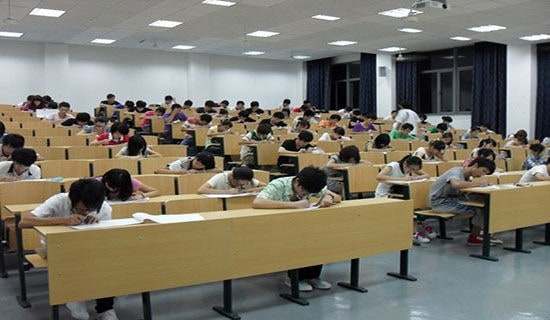- 相關(guān)推薦
英語(yǔ)六級(jí)考試新題型模擬試卷及答案(2)
Part Ⅰ Writing (30 minutes)

Directions: For this part, you are allowed 30 minutes to write a short essay entitled The Popularity of Western Holidays. You should write at least 150 words following the outline given below:
1. 一些“洋”節(jié)日在中國(guó)越來(lái)越流行
2. 一些中國(guó)傳統(tǒng)節(jié)日反倒無(wú)人問(wèn)津
3. 你如何看待這種現(xiàn)象
Part ⅡReading Comprehension (Skimming and Scanning) (15 minutes)
Directions: In this part, you will have 15 minutes to go over the passage quickly and answer the questions on Answer Sheet 1.
For questions 1-4, mark
Y (for YES)if the statement agrees with the information given in the passage;
N (for NO)if the statement contradicts the information given in the passage;
NG (for NOT GIVEN)if the information is not given in the passage.
For questions 5-10, complete the sentences with the information given in the passage.
More than 2,300 universities in over 100 countries have introduced Chinese courses to their curricula, and young overseas nationals flock to China each year to learn Chinese. In 2004, the number of international students in China was 400,000, with an annual increase of 20 percent in the past five years, according to the Chinese Ministry of Education.
The Rise of China’s Economy
Monsieur Label and his wife, both respected architects living in Paris’ Sixth Quarter, have enrolled their daughter in a nearby school where Chinese classes start at kindergarten. Monsieur Label says of China: “I and my colleagues witnessed the country’s amazing development when we attended a recent seminar in Shenzhen. I believe that China is the economic superpower of the future. My wife and I speak French, English and Spanish, but my daughter should also learn Chinese because it will be useful to her when she grows up.”
Since Chinese courses were added to the curricula of 132 French junior and senior high schools their enrollment has doubled. That at the Oriental Language and Culture College, one of France’s largest Chinese?teaching colleges, has skyrocketed in recent years, according to Xu Dan, dean of the Chinese Department. She confirms that Chinese and Japanese are now the two most studied Asian languages.
French junior student Beida is totally fluent in Chinese. “I’m learning Chinese because I want to be an international lawyer in China,” he explains.
Young French entrepreneur Patric Penia established his Beiyan Consultancy Company in Paris, and it now works together with China Central Television in introducing French traditions and culture to Chinese audiences. Patric also cooperated with Beijing’s University of Finance and Economics and Central University of Finance and Economics in launching a three-week crash course in Chinese in Beijing. In 2005, he initiated the “Chinese people and business management” training course in Paris, which consists of seminars to help French businessmen understand how Chinese business operates.
Germany has also caught on to the benefits of Chinese language learning, and has added Chinese to its high school graduation exams. Many international corporations also hold introductory Chinese courses for employee’s assigned work in China. “English isn’t enough,” says Herr Gerck, president of Siemens China, “We need to equip our staff with the ability to deal with Chinese merchants in their own language.”
In Britain, a Chinese teaching program that will form part of the national curriculum has been formulated and approved by the Department of Education and Skills. In the U.S., Chinese is part of the Advance Placement Program for American high school students. This means that students can take college-level Chinese in the same way as they learn French, Spanish and German and gain credits if they get good test results. More than 2,500 primary and high schools now offer AP courses in the Chinese language.
Cultural Echoes
Chinese characters, along with the Confucian philosophy, have always had profound influence on Han cultural circles in Asia, and after a brief hiatus, Chinese language teaching is in demand once more in the ROK, Singapore, Japan and Vietnam.
“Singaporeans rushed to learn English in the 1970s, when it was believed to be the most useful language for the future. Now, in the 21st century, a lack of Chinese-speaking skills is seen as a disadvantage,” says one Singaporean student, who recently graduated from Beijing University with a BA in international relations.
The German ambassador to the ROK once told vice minister of Education Zhang Xinsheng: “Nowadays, high school teachers of German and French must also learn Chinese if they want to keep their jobs.”
In the ROK, a high HSK (Hanyu Shuiping Kaoshi—the Chinese Language Proficiency Test taken by non?native speakers) acts as a springboard for jobs and promotions in large corporations. The number of colleges offering Chinese language courses in the ROK at present stands at 347, compared to 20 in the 1980s. By the year 2007, Chinese courses will be taught in primary and high schools, according to the ROK minister of Education. In the course of China’s economic boom over the past two decades, a large number of Korea
【英語(yǔ)六級(jí)考試新題型模擬試卷及答案2】相關(guān)文章:
2006執(zhí)業(yè)護(hù)士考試全真模擬試卷(2)04-29
6月大學(xué)英語(yǔ)六級(jí)模擬試卷及答案解析06-08
英語(yǔ)六級(jí)考試預(yù)測(cè)試卷(2)05-04
最新英語(yǔ)六級(jí)預(yù)測(cè)試卷答案與詳解(2)05-04
2007年報(bào)關(guān)員考試全真模擬試卷(二)及答案04-29
2007年報(bào)關(guān)員考試全真模擬試卷(一)及答案04-29
05年12月英語(yǔ)六級(jí)考試最新模擬沖刺卷答案05-04